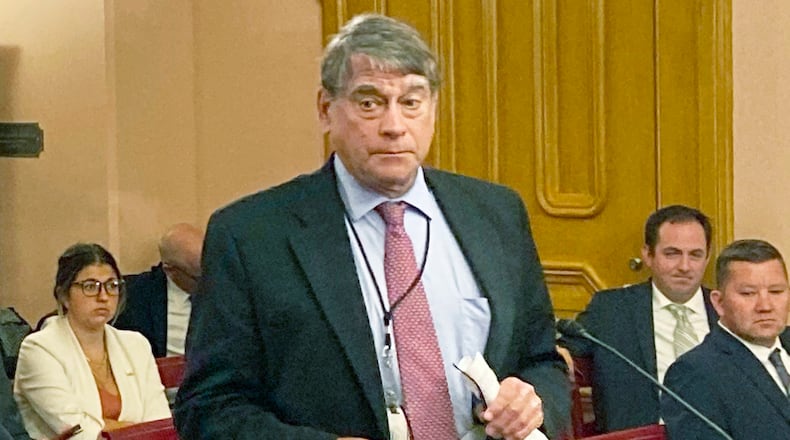The group is tasked with examining issues related to how to provide meaningful property tax relief to homeowners and businesses while ensuring that funding for local schools, fire, police, EMS, libraries, and developmental disabilities is adequate, DeWine said.
DeWine exercised his power to veto pieces of the $60 billion biennium budget three weeks ago, erasing nearly all of the property tax reforms the House and Senate approved in the new two-year spending plan. He said they were harmful to the schools and children.
The House planned to override three of the vetoes on Monday but only mustered votes to restore the provision that eliminates replacement tax levies for all taxing bodies and certain school district levies like emergency tax increases.
Former legislators Bill Seitz and Pat Tiberi are co-chairing the group. DeWine announced the rest of the members on Monday, they include three county commissioners, two county auditors, a county treasurer, two school superintendents and a mayor.
The only committee members from southwest Ohio are Seitz who hails from Cincinnati, Hamilton County Commissioner Denise Driehaus and Warren County Auditor Matt Nolan, who is also president of the County Auditors Association of Ohio.
Seitz told this news outlet DeWine doesn’t have preconceived notions on outcomes for the committee, “it’s not been foreordained,” but they have discussed the mission.
“I think he, like me, is most interested in coming up with something that would provide real relief for those most in need,” Seitz said. “And of course the earlier task force, one of their recommendations was some sort of circuit breaker which I personally have favored ever since my days on the Cincinnati School Board.”
The circuit breaker idea gives tax breaks or credits to both homeowners and renters based on the percentage of their income they pay in property taxes. It was introduced in a Senate bill last year and received two hearings. A similar House bill received one hearing. There are circuit breaker bills in each chamber now— one introduced in January and the other on June 17 — and neither have had hearings.
Under the House version, the state would lose out on $894.8 million in property tax collections in the first year and the Senate bill would cost the state approximately $819.6 million.
Seitz said he understands why the circuit breaker idea hasn’t really taken flight, although many other states employ this type of property tax relief.
“So far the legislature does not seem inclined to put any state money behind this problem. But maybe that will change, who knows,” he said. “I think part of the problem is they don’t really understand that you can design one of these in such a way as not to break the bank. The states that have a circuit breaker for all homeowners, it gets very expensive in a hurry. But there’s 30 states that have a circuit breaker of some kind and we’ll be looking at the various models to see which one we might take a closer look at.”
Nolan’s first reaction was “I don’t have very high expectations” for success especially since “no members of the legislature and no members of the opposition if you will” are on the committee. However, he isn’t being a total defeatist.
“I hope this is a group that comes up with some creative ideas that maybe haven’t been thought of yet, that kind of challenge things,” Nolan said. “I’ve been calling around to different auditors in different states to see how they do things. There’s got to be better ways.”
This will be the second group to examine skyrocketing property taxes. The Joint Legislative Committee on Property Tax Review and Reform —which consisted ofthree Republican lawmakers and two Democrats from each chamber — met eight times last year, received in-person and written testimony from 60 people and on the New Years Eve deadline delivered an 865-page report.
The report contained 21 recommendations for various ways the general assembly should act to address the problem but no favored fixes.
The report notes: “Given the complexities of the property tax system, these recommendations should not be considered as a comprehensive package. Some proposals may contradict others.”
Seitz said they’ll examine that report and “consider any new ideas that might come down the pike.”
About the Author
